University Report: MAF306 - Post-Brexit No-Deal vs. Norway Models
VerifiedAdded on 2022/11/07
|8
|1763
|68
Report
AI Summary
This report provides a comparative analysis of the No-Deal and Norway models in the context of Brexit, evaluating their potential impacts on the UK economy. It begins by outlining the key features of both models, including the implications for trade, access to the European single market, and the free movement of people. The report highlights the advantages and disadvantages of each approach, considering factors such as trade deficits, GDP growth, and the value of the pound sterling. The No-Deal scenario is presented as a potentially damaging strategy, while the Norway model is suggested as a less disruptive alternative that could mitigate some of the negative consequences of Brexit. The analysis draws on various sources to support its arguments, including figures illustrating trade patterns and property price changes. The report concludes that the Norway model may be a more favorable option for the UK, as it can eliminate immigration from the EU without hampering the free trade operations of the country, in contrast to the potentially severe economic problems associated with a No-Deal scenario.
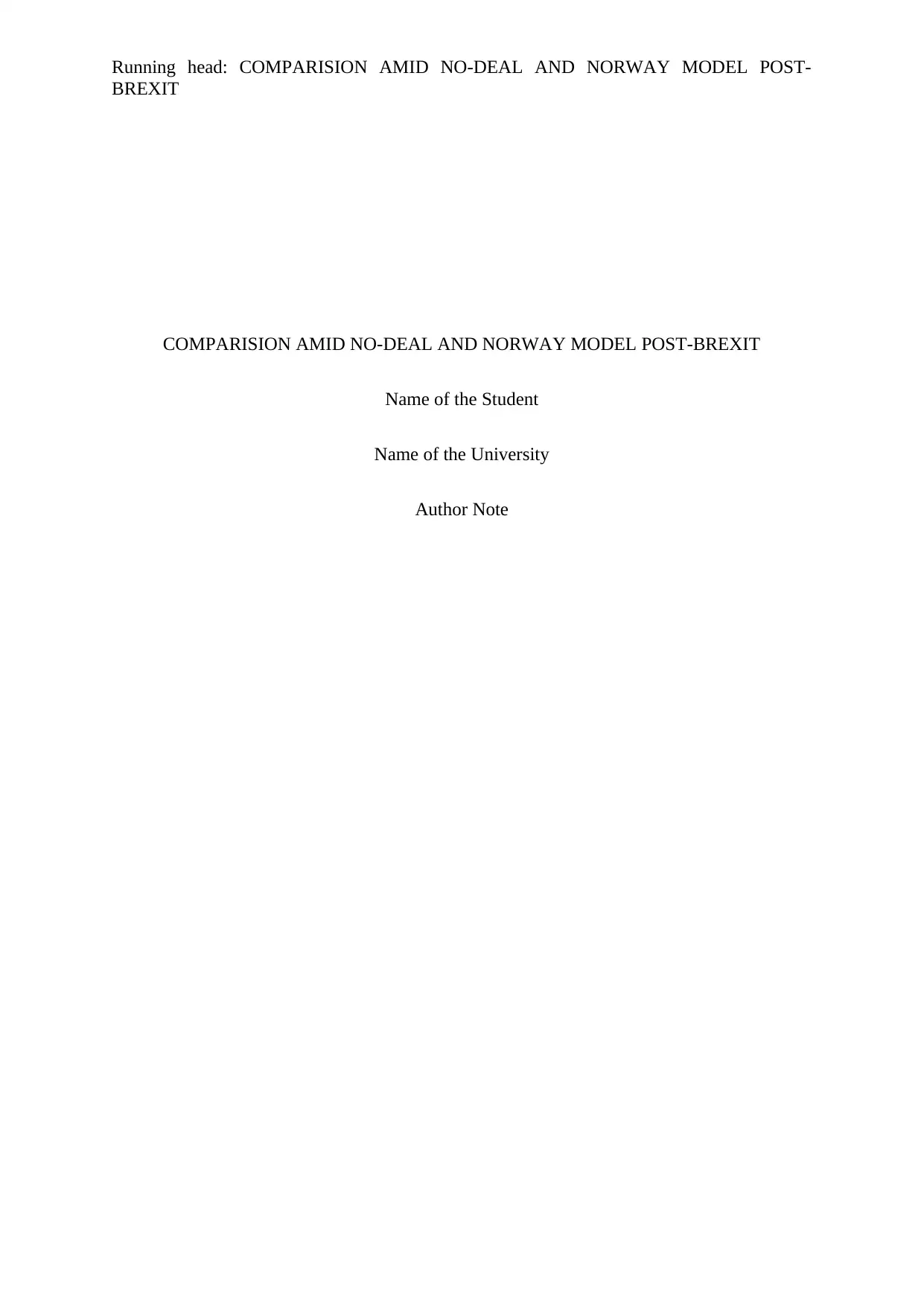
Running head: COMPARISION AMID NO-DEAL AND NORWAY MODEL POST-
BREXIT
COMPARISION AMID NO-DEAL AND NORWAY MODEL POST-BREXIT
Name of the Student
Name of the University
Author Note
BREXIT
COMPARISION AMID NO-DEAL AND NORWAY MODEL POST-BREXIT
Name of the Student
Name of the University
Author Note
Paraphrase This Document
Need a fresh take? Get an instant paraphrase of this document with our AI Paraphraser
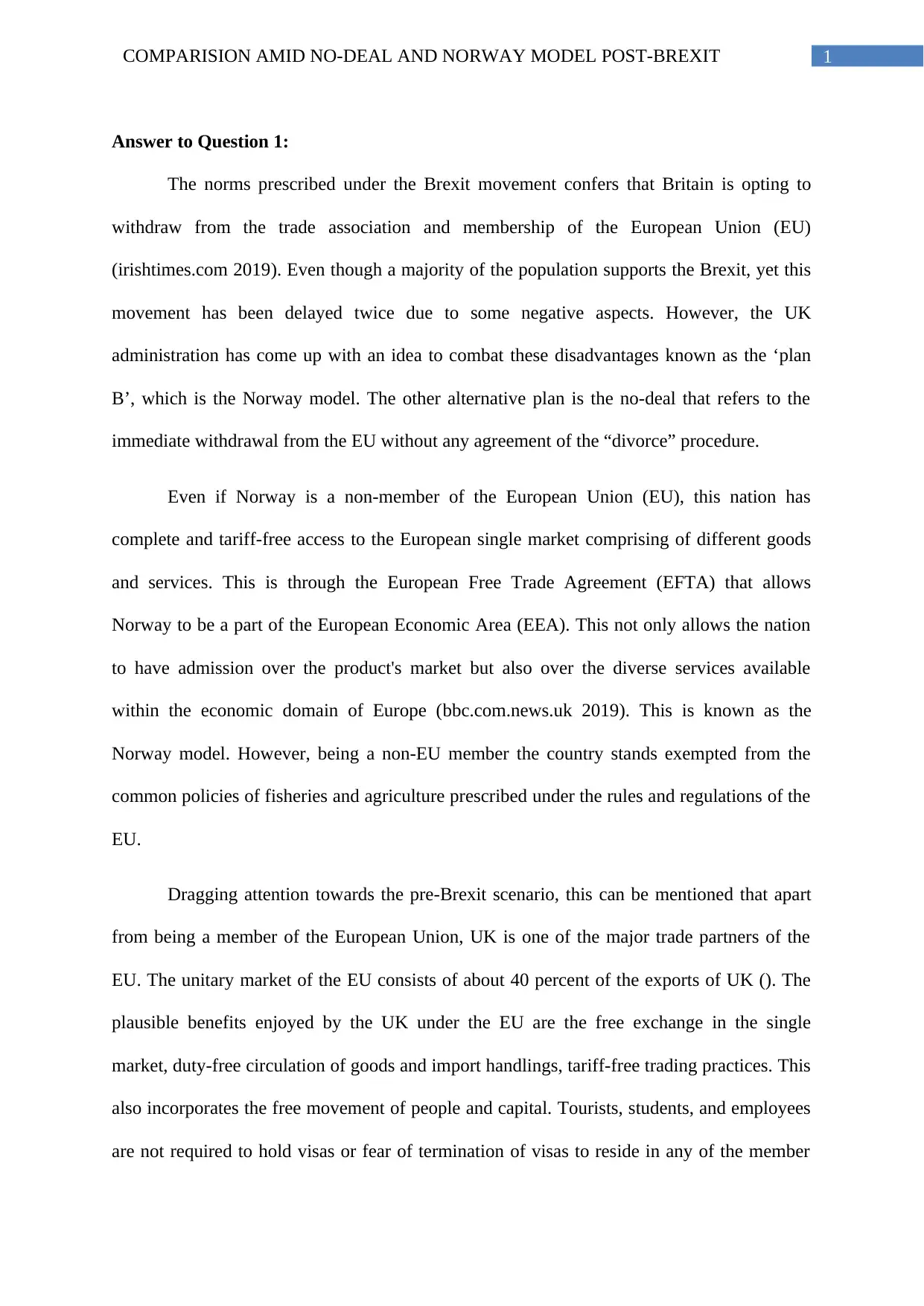
1COMPARISION AMID NO-DEAL AND NORWAY MODEL POST-BREXIT
Answer to Question 1:
The norms prescribed under the Brexit movement confers that Britain is opting to
withdraw from the trade association and membership of the European Union (EU)
(irishtimes.com 2019). Even though a majority of the population supports the Brexit, yet this
movement has been delayed twice due to some negative aspects. However, the UK
administration has come up with an idea to combat these disadvantages known as the ‘plan
B’, which is the Norway model. The other alternative plan is the no-deal that refers to the
immediate withdrawal from the EU without any agreement of the “divorce” procedure.
Even if Norway is a non-member of the European Union (EU), this nation has
complete and tariff-free access to the European single market comprising of different goods
and services. This is through the European Free Trade Agreement (EFTA) that allows
Norway to be a part of the European Economic Area (EEA). This not only allows the nation
to have admission over the product's market but also over the diverse services available
within the economic domain of Europe (bbc.com.news.uk 2019). This is known as the
Norway model. However, being a non-EU member the country stands exempted from the
common policies of fisheries and agriculture prescribed under the rules and regulations of the
EU.
Dragging attention towards the pre-Brexit scenario, this can be mentioned that apart
from being a member of the European Union, UK is one of the major trade partners of the
EU. The unitary market of the EU consists of about 40 percent of the exports of UK (). The
plausible benefits enjoyed by the UK under the EU are the free exchange in the single
market, duty-free circulation of goods and import handlings, tariff-free trading practices. This
also incorporates the free movement of people and capital. Tourists, students, and employees
are not required to hold visas or fear of termination of visas to reside in any of the member
Answer to Question 1:
The norms prescribed under the Brexit movement confers that Britain is opting to
withdraw from the trade association and membership of the European Union (EU)
(irishtimes.com 2019). Even though a majority of the population supports the Brexit, yet this
movement has been delayed twice due to some negative aspects. However, the UK
administration has come up with an idea to combat these disadvantages known as the ‘plan
B’, which is the Norway model. The other alternative plan is the no-deal that refers to the
immediate withdrawal from the EU without any agreement of the “divorce” procedure.
Even if Norway is a non-member of the European Union (EU), this nation has
complete and tariff-free access to the European single market comprising of different goods
and services. This is through the European Free Trade Agreement (EFTA) that allows
Norway to be a part of the European Economic Area (EEA). This not only allows the nation
to have admission over the product's market but also over the diverse services available
within the economic domain of Europe (bbc.com.news.uk 2019). This is known as the
Norway model. However, being a non-EU member the country stands exempted from the
common policies of fisheries and agriculture prescribed under the rules and regulations of the
EU.
Dragging attention towards the pre-Brexit scenario, this can be mentioned that apart
from being a member of the European Union, UK is one of the major trade partners of the
EU. The unitary market of the EU consists of about 40 percent of the exports of UK (). The
plausible benefits enjoyed by the UK under the EU are the free exchange in the single
market, duty-free circulation of goods and import handlings, tariff-free trading practices. This
also incorporates the free movement of people and capital. Tourists, students, and employees
are not required to hold visas or fear of termination of visas to reside in any of the member
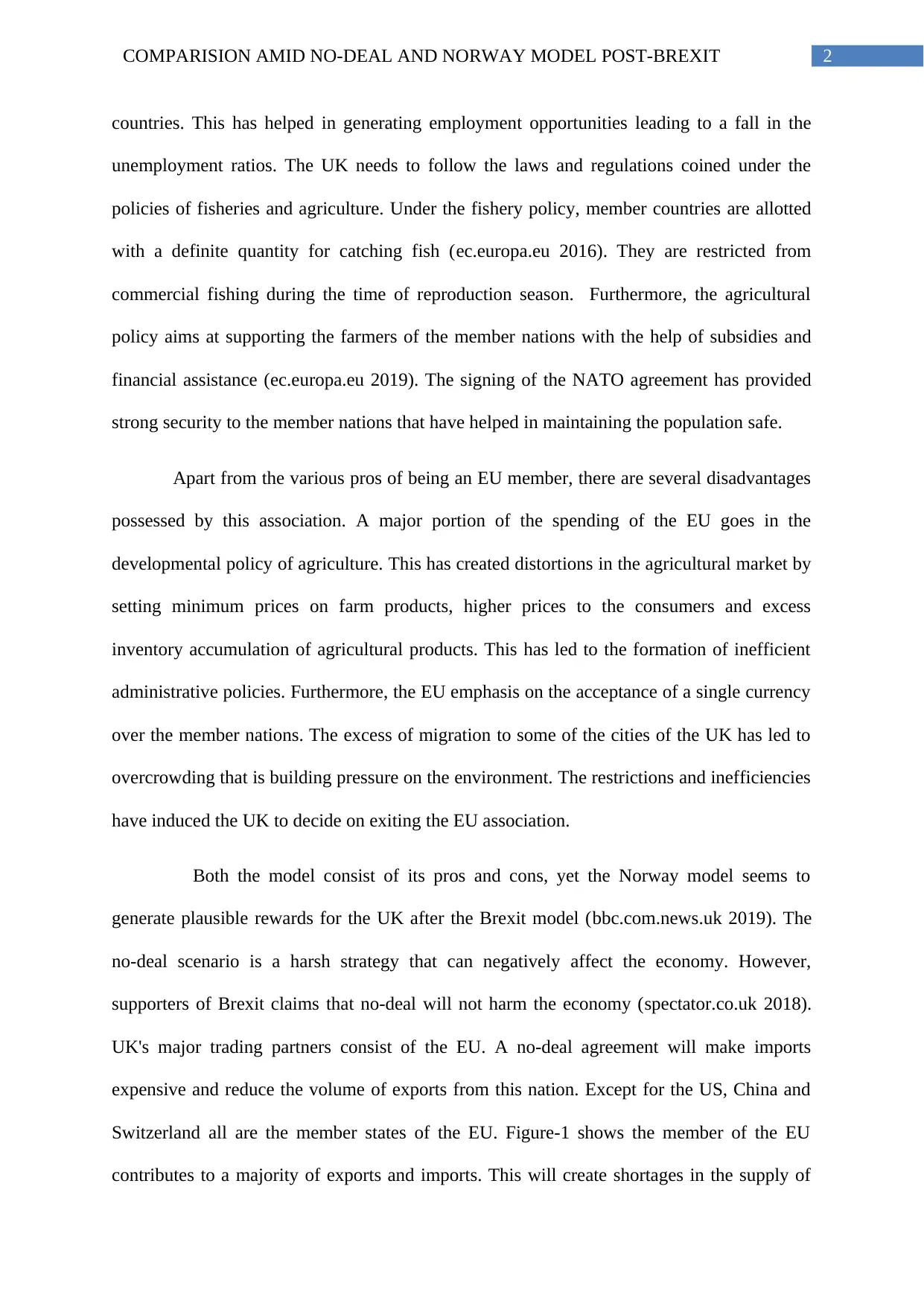
2COMPARISION AMID NO-DEAL AND NORWAY MODEL POST-BREXIT
countries. This has helped in generating employment opportunities leading to a fall in the
unemployment ratios. The UK needs to follow the laws and regulations coined under the
policies of fisheries and agriculture. Under the fishery policy, member countries are allotted
with a definite quantity for catching fish (ec.europa.eu 2016). They are restricted from
commercial fishing during the time of reproduction season. Furthermore, the agricultural
policy aims at supporting the farmers of the member nations with the help of subsidies and
financial assistance (ec.europa.eu 2019). The signing of the NATO agreement has provided
strong security to the member nations that have helped in maintaining the population safe.
Apart from the various pros of being an EU member, there are several disadvantages
possessed by this association. A major portion of the spending of the EU goes in the
developmental policy of agriculture. This has created distortions in the agricultural market by
setting minimum prices on farm products, higher prices to the consumers and excess
inventory accumulation of agricultural products. This has led to the formation of inefficient
administrative policies. Furthermore, the EU emphasis on the acceptance of a single currency
over the member nations. The excess of migration to some of the cities of the UK has led to
overcrowding that is building pressure on the environment. The restrictions and inefficiencies
have induced the UK to decide on exiting the EU association.
Both the model consist of its pros and cons, yet the Norway model seems to
generate plausible rewards for the UK after the Brexit model (bbc.com.news.uk 2019). The
no-deal scenario is a harsh strategy that can negatively affect the economy. However,
supporters of Brexit claims that no-deal will not harm the economy (spectator.co.uk 2018).
UK's major trading partners consist of the EU. A no-deal agreement will make imports
expensive and reduce the volume of exports from this nation. Except for the US, China and
Switzerland all are the member states of the EU. Figure-1 shows the member of the EU
contributes to a majority of exports and imports. This will create shortages in the supply of
countries. This has helped in generating employment opportunities leading to a fall in the
unemployment ratios. The UK needs to follow the laws and regulations coined under the
policies of fisheries and agriculture. Under the fishery policy, member countries are allotted
with a definite quantity for catching fish (ec.europa.eu 2016). They are restricted from
commercial fishing during the time of reproduction season. Furthermore, the agricultural
policy aims at supporting the farmers of the member nations with the help of subsidies and
financial assistance (ec.europa.eu 2019). The signing of the NATO agreement has provided
strong security to the member nations that have helped in maintaining the population safe.
Apart from the various pros of being an EU member, there are several disadvantages
possessed by this association. A major portion of the spending of the EU goes in the
developmental policy of agriculture. This has created distortions in the agricultural market by
setting minimum prices on farm products, higher prices to the consumers and excess
inventory accumulation of agricultural products. This has led to the formation of inefficient
administrative policies. Furthermore, the EU emphasis on the acceptance of a single currency
over the member nations. The excess of migration to some of the cities of the UK has led to
overcrowding that is building pressure on the environment. The restrictions and inefficiencies
have induced the UK to decide on exiting the EU association.
Both the model consist of its pros and cons, yet the Norway model seems to
generate plausible rewards for the UK after the Brexit model (bbc.com.news.uk 2019). The
no-deal scenario is a harsh strategy that can negatively affect the economy. However,
supporters of Brexit claims that no-deal will not harm the economy (spectator.co.uk 2018).
UK's major trading partners consist of the EU. A no-deal agreement will make imports
expensive and reduce the volume of exports from this nation. Except for the US, China and
Switzerland all are the member states of the EU. Figure-1 shows the member of the EU
contributes to a majority of exports and imports. This will create shortages in the supply of
⊘ This is a preview!⊘
Do you want full access?
Subscribe today to unlock all pages.

Trusted by 1+ million students worldwide
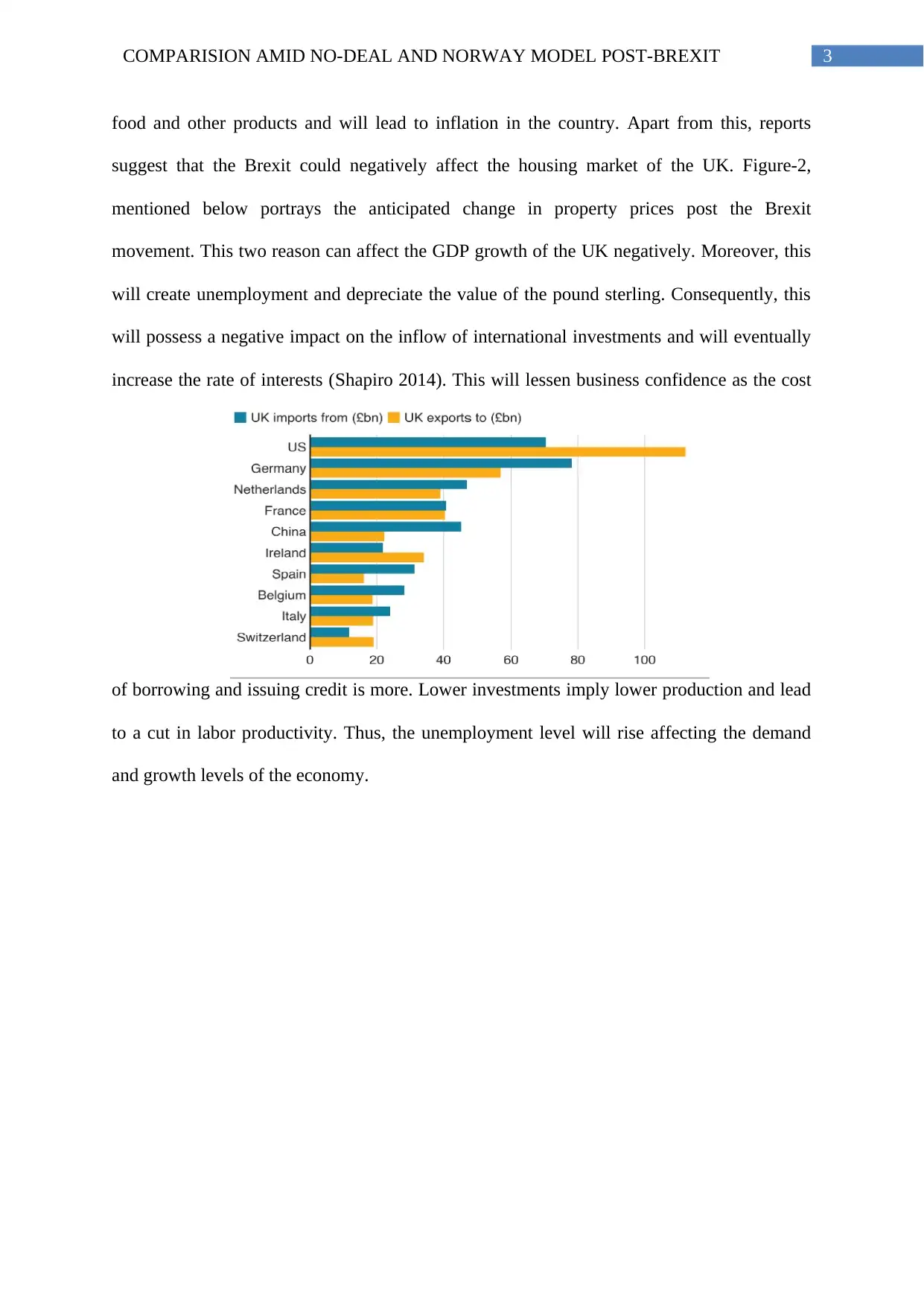
3COMPARISION AMID NO-DEAL AND NORWAY MODEL POST-BREXIT
food and other products and will lead to inflation in the country. Apart from this, reports
suggest that the Brexit could negatively affect the housing market of the UK. Figure-2,
mentioned below portrays the anticipated change in property prices post the Brexit
movement. This two reason can affect the GDP growth of the UK negatively. Moreover, this
will create unemployment and depreciate the value of the pound sterling. Consequently, this
will possess a negative impact on the inflow of international investments and will eventually
increase the rate of interests (Shapiro 2014). This will lessen business confidence as the cost
of borrowing and issuing credit is more. Lower investments imply lower production and lead
to a cut in labor productivity. Thus, the unemployment level will rise affecting the demand
and growth levels of the economy.
food and other products and will lead to inflation in the country. Apart from this, reports
suggest that the Brexit could negatively affect the housing market of the UK. Figure-2,
mentioned below portrays the anticipated change in property prices post the Brexit
movement. This two reason can affect the GDP growth of the UK negatively. Moreover, this
will create unemployment and depreciate the value of the pound sterling. Consequently, this
will possess a negative impact on the inflow of international investments and will eventually
increase the rate of interests (Shapiro 2014). This will lessen business confidence as the cost
of borrowing and issuing credit is more. Lower investments imply lower production and lead
to a cut in labor productivity. Thus, the unemployment level will rise affecting the demand
and growth levels of the economy.
Paraphrase This Document
Need a fresh take? Get an instant paraphrase of this document with our AI Paraphraser
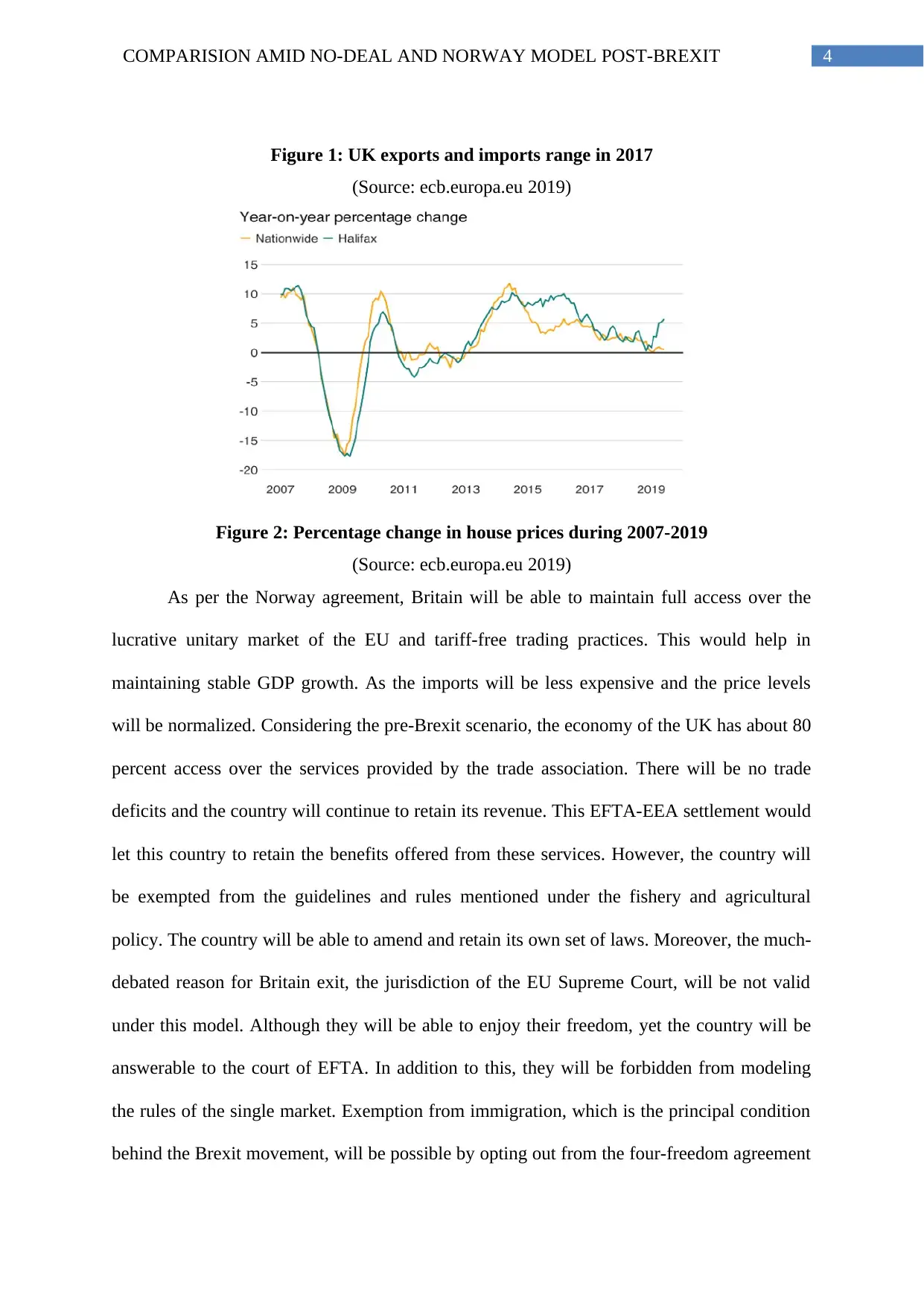
4COMPARISION AMID NO-DEAL AND NORWAY MODEL POST-BREXIT
Figure 1: UK exports and imports range in 2017
(Source: ecb.europa.eu 2019)
Figure 2: Percentage change in house prices during 2007-2019
(Source: ecb.europa.eu 2019)
As per the Norway agreement, Britain will be able to maintain full access over the
lucrative unitary market of the EU and tariff-free trading practices. This would help in
maintaining stable GDP growth. As the imports will be less expensive and the price levels
will be normalized. Considering the pre-Brexit scenario, the economy of the UK has about 80
percent access over the services provided by the trade association. There will be no trade
deficits and the country will continue to retain its revenue. This EFTA-EEA settlement would
let this country to retain the benefits offered from these services. However, the country will
be exempted from the guidelines and rules mentioned under the fishery and agricultural
policy. The country will be able to amend and retain its own set of laws. Moreover, the much-
debated reason for Britain exit, the jurisdiction of the EU Supreme Court, will be not valid
under this model. Although they will be able to enjoy their freedom, yet the country will be
answerable to the court of EFTA. In addition to this, they will be forbidden from modeling
the rules of the single market. Exemption from immigration, which is the principal condition
behind the Brexit movement, will be possible by opting out from the four-freedom agreement
Figure 1: UK exports and imports range in 2017
(Source: ecb.europa.eu 2019)
Figure 2: Percentage change in house prices during 2007-2019
(Source: ecb.europa.eu 2019)
As per the Norway agreement, Britain will be able to maintain full access over the
lucrative unitary market of the EU and tariff-free trading practices. This would help in
maintaining stable GDP growth. As the imports will be less expensive and the price levels
will be normalized. Considering the pre-Brexit scenario, the economy of the UK has about 80
percent access over the services provided by the trade association. There will be no trade
deficits and the country will continue to retain its revenue. This EFTA-EEA settlement would
let this country to retain the benefits offered from these services. However, the country will
be exempted from the guidelines and rules mentioned under the fishery and agricultural
policy. The country will be able to amend and retain its own set of laws. Moreover, the much-
debated reason for Britain exit, the jurisdiction of the EU Supreme Court, will be not valid
under this model. Although they will be able to enjoy their freedom, yet the country will be
answerable to the court of EFTA. In addition to this, they will be forbidden from modeling
the rules of the single market. Exemption from immigration, which is the principal condition
behind the Brexit movement, will be possible by opting out from the four-freedom agreement
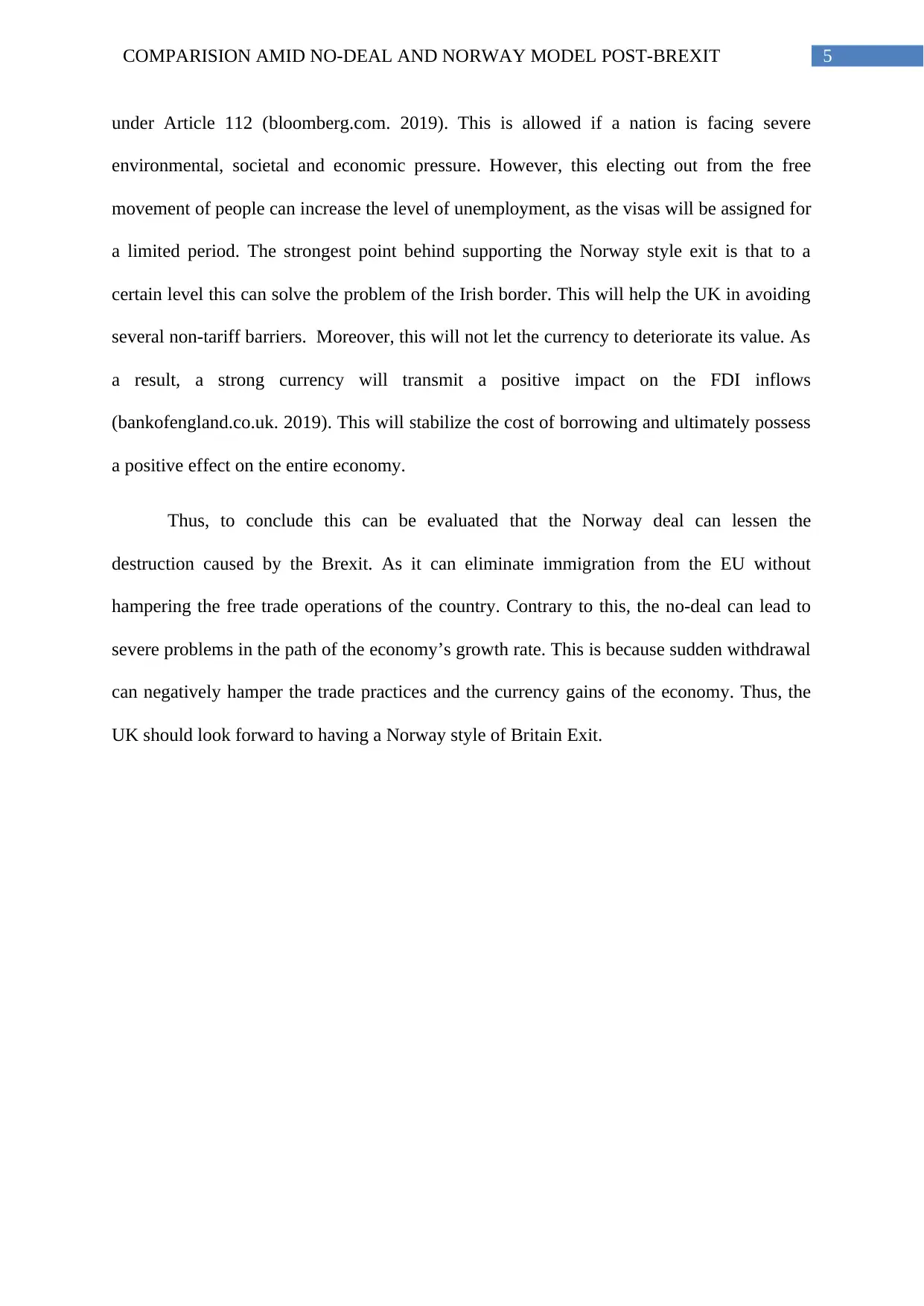
5COMPARISION AMID NO-DEAL AND NORWAY MODEL POST-BREXIT
under Article 112 (bloomberg.com. 2019). This is allowed if a nation is facing severe
environmental, societal and economic pressure. However, this electing out from the free
movement of people can increase the level of unemployment, as the visas will be assigned for
a limited period. The strongest point behind supporting the Norway style exit is that to a
certain level this can solve the problem of the Irish border. This will help the UK in avoiding
several non-tariff barriers. Moreover, this will not let the currency to deteriorate its value. As
a result, a strong currency will transmit a positive impact on the FDI inflows
(bankofengland.co.uk. 2019). This will stabilize the cost of borrowing and ultimately possess
a positive effect on the entire economy.
Thus, to conclude this can be evaluated that the Norway deal can lessen the
destruction caused by the Brexit. As it can eliminate immigration from the EU without
hampering the free trade operations of the country. Contrary to this, the no-deal can lead to
severe problems in the path of the economy’s growth rate. This is because sudden withdrawal
can negatively hamper the trade practices and the currency gains of the economy. Thus, the
UK should look forward to having a Norway style of Britain Exit.
under Article 112 (bloomberg.com. 2019). This is allowed if a nation is facing severe
environmental, societal and economic pressure. However, this electing out from the free
movement of people can increase the level of unemployment, as the visas will be assigned for
a limited period. The strongest point behind supporting the Norway style exit is that to a
certain level this can solve the problem of the Irish border. This will help the UK in avoiding
several non-tariff barriers. Moreover, this will not let the currency to deteriorate its value. As
a result, a strong currency will transmit a positive impact on the FDI inflows
(bankofengland.co.uk. 2019). This will stabilize the cost of borrowing and ultimately possess
a positive effect on the entire economy.
Thus, to conclude this can be evaluated that the Norway deal can lessen the
destruction caused by the Brexit. As it can eliminate immigration from the EU without
hampering the free trade operations of the country. Contrary to this, the no-deal can lead to
severe problems in the path of the economy’s growth rate. This is because sudden withdrawal
can negatively hamper the trade practices and the currency gains of the economy. Thus, the
UK should look forward to having a Norway style of Britain Exit.
⊘ This is a preview!⊘
Do you want full access?
Subscribe today to unlock all pages.

Trusted by 1+ million students worldwide
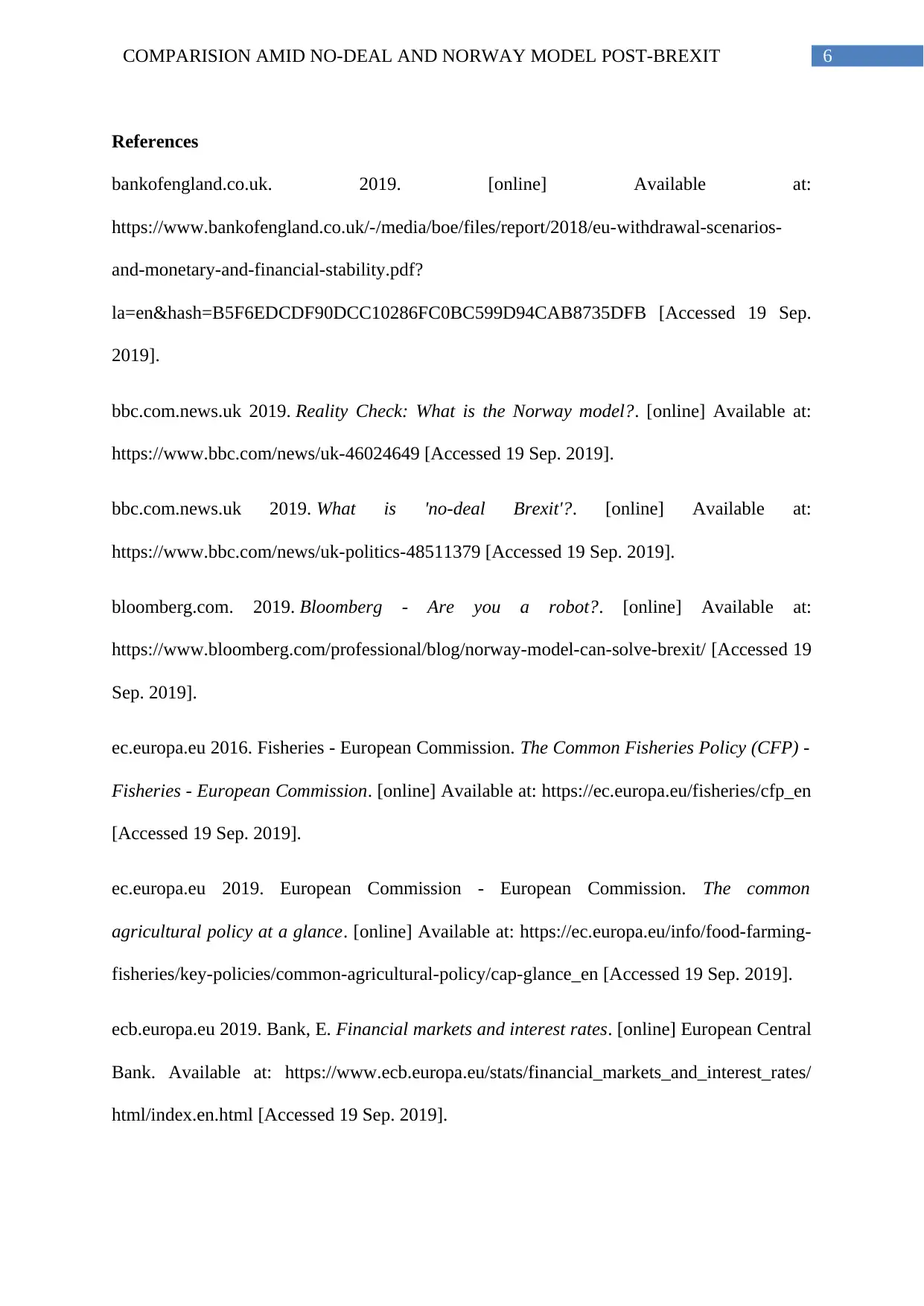
6COMPARISION AMID NO-DEAL AND NORWAY MODEL POST-BREXIT
References
bankofengland.co.uk. 2019. [online] Available at:
https://www.bankofengland.co.uk/-/media/boe/files/report/2018/eu-withdrawal-scenarios-
and-monetary-and-financial-stability.pdf?
la=en&hash=B5F6EDCDF90DCC10286FC0BC599D94CAB8735DFB [Accessed 19 Sep.
2019].
bbc.com.news.uk 2019. Reality Check: What is the Norway model?. [online] Available at:
https://www.bbc.com/news/uk-46024649 [Accessed 19 Sep. 2019].
bbc.com.news.uk 2019. What is 'no-deal Brexit'?. [online] Available at:
https://www.bbc.com/news/uk-politics-48511379 [Accessed 19 Sep. 2019].
bloomberg.com. 2019. Bloomberg - Are you a robot?. [online] Available at:
https://www.bloomberg.com/professional/blog/norway-model-can-solve-brexit/ [Accessed 19
Sep. 2019].
ec.europa.eu 2016. Fisheries - European Commission. The Common Fisheries Policy (CFP) -
Fisheries - European Commission. [online] Available at: https://ec.europa.eu/fisheries/cfp_en
[Accessed 19 Sep. 2019].
ec.europa.eu 2019. European Commission - European Commission. The common
agricultural policy at a glance. [online] Available at: https://ec.europa.eu/info/food-farming-
fisheries/key-policies/common-agricultural-policy/cap-glance_en [Accessed 19 Sep. 2019].
ecb.europa.eu 2019. Bank, E. Financial markets and interest rates. [online] European Central
Bank. Available at: https://www.ecb.europa.eu/stats/financial_markets_and_interest_rates/
html/index.en.html [Accessed 19 Sep. 2019].
References
bankofengland.co.uk. 2019. [online] Available at:
https://www.bankofengland.co.uk/-/media/boe/files/report/2018/eu-withdrawal-scenarios-
and-monetary-and-financial-stability.pdf?
la=en&hash=B5F6EDCDF90DCC10286FC0BC599D94CAB8735DFB [Accessed 19 Sep.
2019].
bbc.com.news.uk 2019. Reality Check: What is the Norway model?. [online] Available at:
https://www.bbc.com/news/uk-46024649 [Accessed 19 Sep. 2019].
bbc.com.news.uk 2019. What is 'no-deal Brexit'?. [online] Available at:
https://www.bbc.com/news/uk-politics-48511379 [Accessed 19 Sep. 2019].
bloomberg.com. 2019. Bloomberg - Are you a robot?. [online] Available at:
https://www.bloomberg.com/professional/blog/norway-model-can-solve-brexit/ [Accessed 19
Sep. 2019].
ec.europa.eu 2016. Fisheries - European Commission. The Common Fisheries Policy (CFP) -
Fisheries - European Commission. [online] Available at: https://ec.europa.eu/fisheries/cfp_en
[Accessed 19 Sep. 2019].
ec.europa.eu 2019. European Commission - European Commission. The common
agricultural policy at a glance. [online] Available at: https://ec.europa.eu/info/food-farming-
fisheries/key-policies/common-agricultural-policy/cap-glance_en [Accessed 19 Sep. 2019].
ecb.europa.eu 2019. Bank, E. Financial markets and interest rates. [online] European Central
Bank. Available at: https://www.ecb.europa.eu/stats/financial_markets_and_interest_rates/
html/index.en.html [Accessed 19 Sep. 2019].
Paraphrase This Document
Need a fresh take? Get an instant paraphrase of this document with our AI Paraphraser
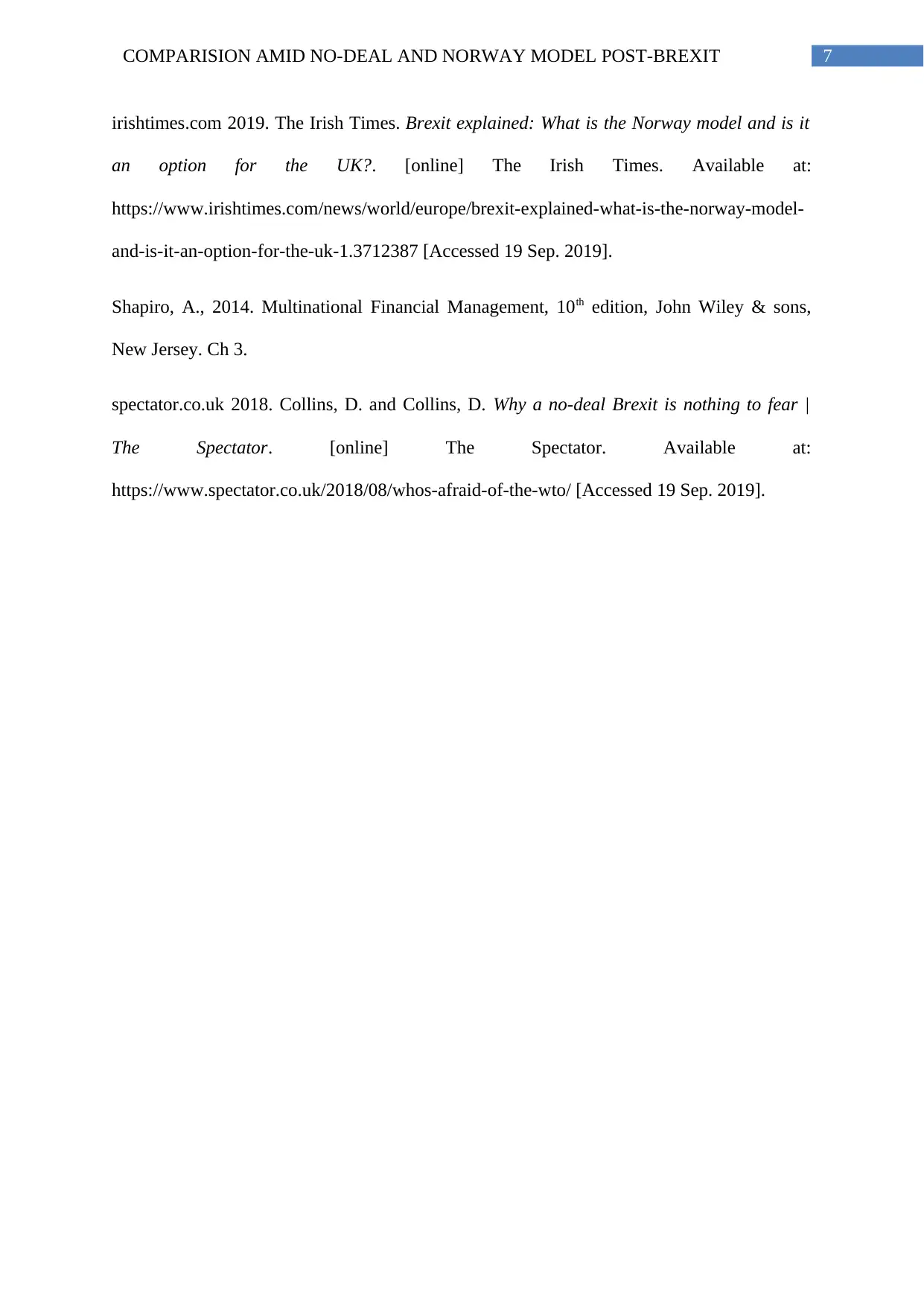
7COMPARISION AMID NO-DEAL AND NORWAY MODEL POST-BREXIT
irishtimes.com 2019. The Irish Times. Brexit explained: What is the Norway model and is it
an option for the UK?. [online] The Irish Times. Available at:
https://www.irishtimes.com/news/world/europe/brexit-explained-what-is-the-norway-model-
and-is-it-an-option-for-the-uk-1.3712387 [Accessed 19 Sep. 2019].
Shapiro, A., 2014. Multinational Financial Management, 10th edition, John Wiley & sons,
New Jersey. Ch 3.
spectator.co.uk 2018. Collins, D. and Collins, D. Why a no-deal Brexit is nothing to fear |
The Spectator. [online] The Spectator. Available at:
https://www.spectator.co.uk/2018/08/whos-afraid-of-the-wto/ [Accessed 19 Sep. 2019].
irishtimes.com 2019. The Irish Times. Brexit explained: What is the Norway model and is it
an option for the UK?. [online] The Irish Times. Available at:
https://www.irishtimes.com/news/world/europe/brexit-explained-what-is-the-norway-model-
and-is-it-an-option-for-the-uk-1.3712387 [Accessed 19 Sep. 2019].
Shapiro, A., 2014. Multinational Financial Management, 10th edition, John Wiley & sons,
New Jersey. Ch 3.
spectator.co.uk 2018. Collins, D. and Collins, D. Why a no-deal Brexit is nothing to fear |
The Spectator. [online] The Spectator. Available at:
https://www.spectator.co.uk/2018/08/whos-afraid-of-the-wto/ [Accessed 19 Sep. 2019].
1 out of 8
Related Documents
Your All-in-One AI-Powered Toolkit for Academic Success.
+13062052269
info@desklib.com
Available 24*7 on WhatsApp / Email
![[object Object]](/_next/static/media/star-bottom.7253800d.svg)
Unlock your academic potential
Copyright © 2020–2026 A2Z Services. All Rights Reserved. Developed and managed by ZUCOL.




